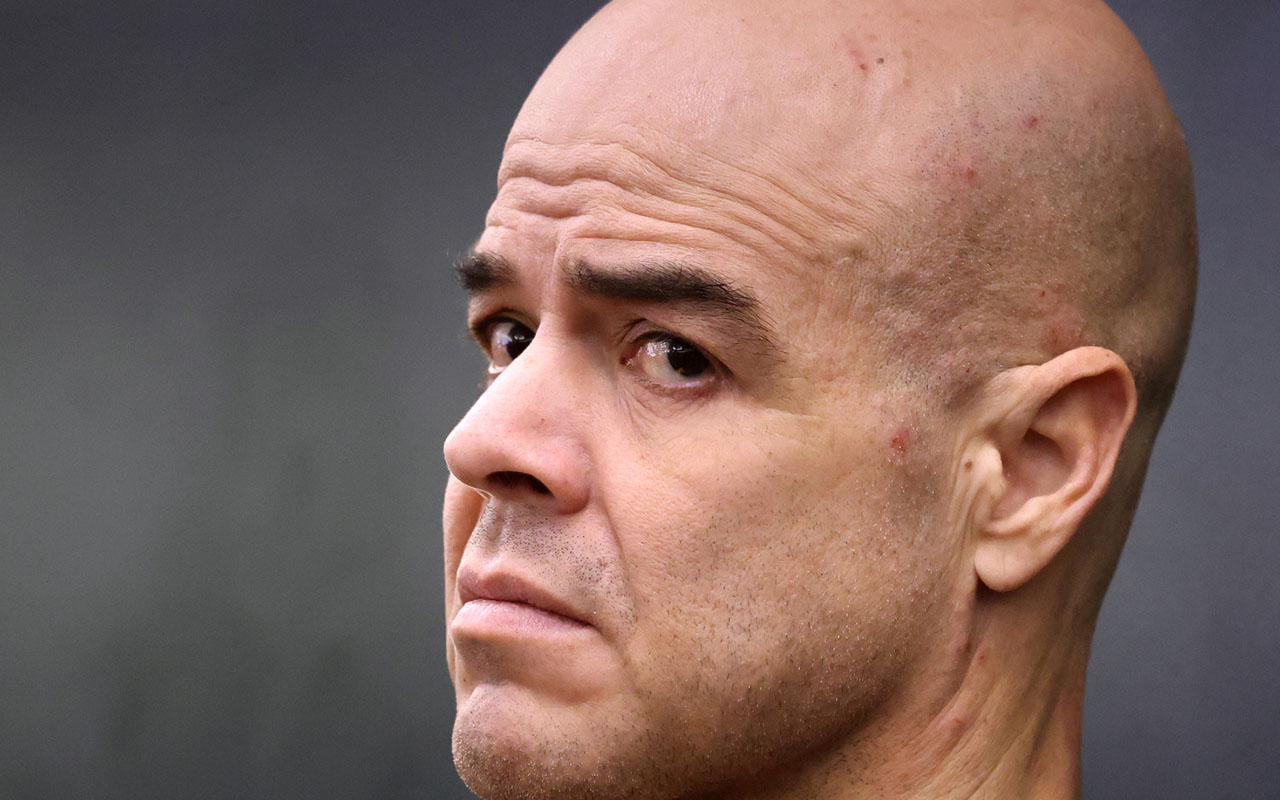For more than a decade, Robert Telles yearned to climb the social and political ladders in Las Vegas.
The HVAC technician enrolled part time at UNLV’s Boyd law school and became president of the student bar. He opened a probate firm and was elected three years later to a low-level county office as public administrator. To some, the 46-year-old was a respected family man who fancied himself a rising star in the Democratic Party and had aspirations to become governor. He frequented Rotary Club events with his wife, Mae Ismael, and was crowned one nonprofit’s pro bono attorney of the year in 2014.
But to many of his classmates and employees, Telles used his authority to terrorize, control and prey on women.
They level a number of accusations: He groped another student while at UNLV; he kissed his former paralegal’s ear and touched her inappropriately; he castigated employees for eating lunch at their desks and decorating the office for a colleague’s birthday; he bellowed orders and threatened to demote those he perceived to have wronged him.
Telles’ toxic behavior never raised alarms at the institutions that could have held him accountable.
Clark County officials told anxious workers, who repeatedly complained, there was nothing they could do. His elected position shielded him, even when some actions were alleged to be illegal. Records show top county managers knew Telles was arrested in 2020 and charged with battering his wife while drunk, but his employees say they were never alerted.
His brazen and sometimes bizarre conduct went mostly unchecked until May, when Review-Journal investigative reporter Jeff German exposed allegations about Telles at the Clark County Public Administrator’s Office.
Telles’ carefully maintained facade cracked, and he became more hostile to German and the county employees — whom he blamed for his undoing.
“The guy had the ability to be charming, and he fooled a lot of people,” says former public administrator John Cahill, who endorsed Telles in 2018 and later became the target of his wrath on Facebook. “You would never know from things before he started being the boss that there was anything haywire.”
Telles, who lost re-election in the primary, learned German was still seeking records about his work communications in late July. Telles angrily texted one employee on Aug. 28: “You will have to live with everything that has been done here.”
A county attorney told Telles in early September that copies of his emails would be released to German, new documents revealed this week. Hours later, the 69-year-old longtime reporter was stabbed to death outside his home.
Telles, charged with the grisly murder, was stripped of his office in October and denied bail. He declined to comment, and messages to his attorney were not returned.
“Finally, this guy got caught,” says one former employee of his law firm, who provided a 2016 letter she says her attorney sent Telles demanding he cease behavior deemed “harassing” and “of a sexual nature.”
This story reveals much of what German had started investigating before his slaying.
Interviews with 18 of Telles’ former colleagues and classmates, along with documents obtained by the Review-Journal, characterize a man desperate to protect his public persona. His reputation remained untarnished by misconduct allegations that never seemed to stick, or that some say they were too fearful to bring to light.
Some sources say they are still petrified a decade later, even with Telles behind bars. The Review-Journal has granted them anonymity due to their fears of retaliation.
They describe Telles as changing his demeanor on a dime — from antagonistic and nasty to soft-spoken and caring. County employees called him “tri-polar,” as his pleasantries would give way to hateful bursts of rage in mere minutes.
“We were all alone in our own personal torture,” says one public administrator employee, Jessica Coleman. “We’re shattered shells of people now.”
UNLV: A welcome-back party and claims of sexual harassment, bullying
As students at UNLV revved up for their fall 2012 semester, one of the college’s law school fraternities hosted its annual welcome-back party.
Telles, then a 35-year-old student bar association president and night school student, was in attendance. A father of three in his second marriage, he still worked full time as an air conditioning technician at the College of Southern Nevada.
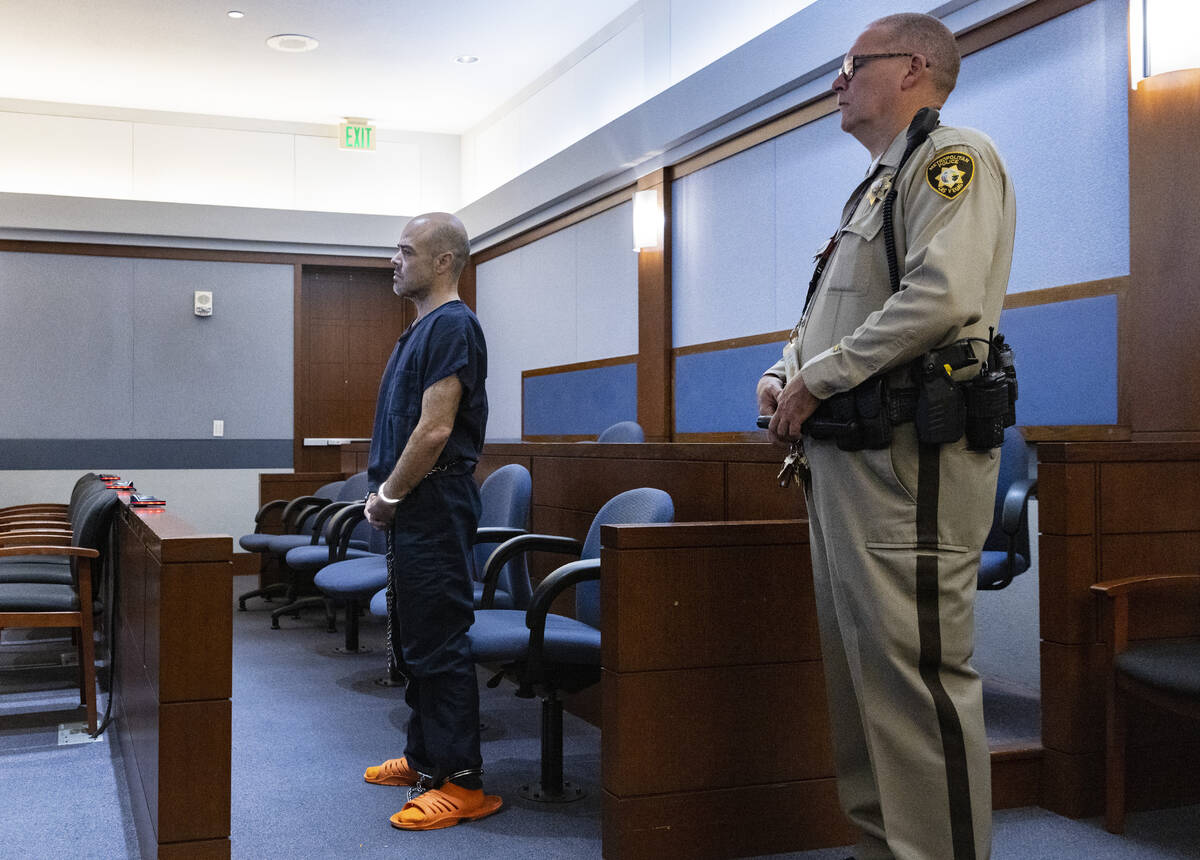
Small in stature, Telles was known by his classmates as a well-spoken overachiever interested in progressive politics. In a speech to students, he referred to himself as “Mr. Clean,” a nod to his shiny bald head.
He came from a political dynasty in his hometown of El Paso: His great-uncle Raymond was the first Mexican-American mayor of the city and was later tapped by President John F. Kennedy to be the ambassador to Costa Rica. His grandfather served for nearly 20 years as a county commissioner, and his father served on the City Council before pleading guilty in 2008 for his part in a conspiracy to bribe local officials for votes.
Becoming president of UNLV’s student bar association was a point of pride for Robert Telles, his peers recall.
“The student bar association position is nothing,” former classmate Carlos Morales says. “But he walked around like he was the governor of the state, expected to be greeted every time he walked into the room.”
The night of the Phi Alpha Delta bash, there were multiple kegs, hard alcohol, a DJ and a photo booth, according to Morales and one other former student who was at the party. Telles seemed in a celebratory mood, and as the night wore on, he became noticeably drunk and slurred his words, Morales recalls.
He says several people saw what happened next: Telles put his hand on the inner thigh of a first-year law student.
“I grabbed him, took him into a corner and berated him,” says Morales, a burly man roughly 120 pounds heavier than Telles.
No victim ever came forward publicly, but Morales says the woman confided in him that she was uncomfortable with how Telles touched her.
Less than a week after the party, members of the student bar association met in a first-floor classroom on campus.
Morales and other board members told Telles he needed to resign as president, and that his behavior could be characterized as sexual harassment, according to Sept. 5, 2012, meeting minutes obtained by the Review-Journal.
Telles claimed he was too drunk to remember much of the night’s events, according to the minutes. He demanded the name of his accuser.
Morales told the group that the woman was scared to make a report because she did not want to make waves in “a small legal community,” the minutes state.
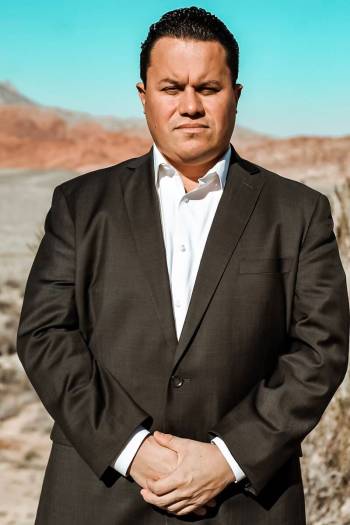
One woman said that as much as it hurt her to say it, she saw Telles touching the student inappropriately, according to the document. Another testified that she also witnessed what happened.
Two other board members at the meeting said that Telles had also threatened “a physical altercation” with a fraternity board member who tried to prevent him from driving under the influence the night of the party. Telles responded that he and the board member had spoken and “were cool,” according to the minutes.
The secretary moved to hold an impeachment hearing but offered Telles the option to resign instead. He said he would think about it, but later refused and denied touching anyone.
The law school student body that semester consisted of those who supported Telles — or at least argued he wasn’t being given due process — and those who believed the unnamed accuser and wanted to recall Telles. Many others simply wanted to stop hearing about it.
“It very quickly became part of the consciousness of every student at Boyd,” says Andrew Coates, a Henderson attorney and Nye County public defender who served as vice president of the student bar and became interim president after Telles.
One student claimed in an email that Telles had approached witnesses, another compared the scandal to a petty children’s fight and a third described nearly being punched during a dispute over Telles.
As the battle played out publicly, Telles ostracized and bullied the students who accused him of misconduct, according to former students. He campaigned to find out his alleged victim’s identity. He threatened to sue the entire board for defaming his character, which the students would have had to report to the State Bar of Nevada. At least three board members resigned, including Morales, who provided the Review-Journal with a letter in which Telles referred to a possible lawsuit.
Those at the center of the division say UNLV took a hands-off approach, letting the students fight it out.
“They just advised us to be very cautious about any disciplinary proceedings, as to not open the school or ourselves personally to any litigation,” Coates says.
Instead of an impeachment hearing, enough students signed a petition for the board to institute a vote of no confidence against Telles. Ahead of the vote, he handed campaign fliers to students outside the school. Coates and another source independently provided what they say is an email Telles sent the law school’s entire student body, claiming his “bear hug” had been mischaracterized as inappropriate touching.
Telles was ousted after an online vote that October. Coates gave the Review-Journal what he says was another email in which Telles recounted his discontent with the process to his peers.
“The things that many of you heard were absolutely false and were fabricated in an effort to play some political game,” Telles wrote. “There was absolutely no regard to the impact that this would all have on me and our community.”
Morales provided a letter he says came from Boyd’s Office of Student Conduct Director Phillip Burns. The March 2013 letter indicates the office exonerated Telles after an investigation that produced “no credible evidence” of sexual harassment.
“I urge each individual involved to cease the unnecessary, negative, and harmful rumor and accusations that continue,” the letter reads.
Resolution of SBA allegatio... by Las Vegas Review-Journal
A UNLV spokesman issued a statement this week, saying the school can’t comment on any student’s confidential educational records. Burns did not return a reporter’s calls and emails.
Telles shared the investigation’s findings in a two-page email to his classmates.
“I am not the tyrant or jerk that it seems has been asserted in rumors and allegations,” he wrote.
Under Nevada law, student discipline records are subject to scrutiny by the state bar. It’s unclear if bar officials reviewed Telles’ record because such matters are closely guarded.
He graduated in the spring of 2014 and became a licensed attorney the next January.
Accolade Law: Starting a small firm, but aspiring for a political career
Holding office was still on Telles’ mind when he opened Accolade Law in Las Vegas in 2015.
He tasked one of his first employees, John Conger, with compiling a list of local elected offices without an incumbent running. It was an unusual request, as Accolade focused on family law, probate and estate planning.
“He had political ambitions for sure,” says Conger, a paralegal intern at the time. “He was just a young lawyer, up-and-coming, and he had a lot going for him.”
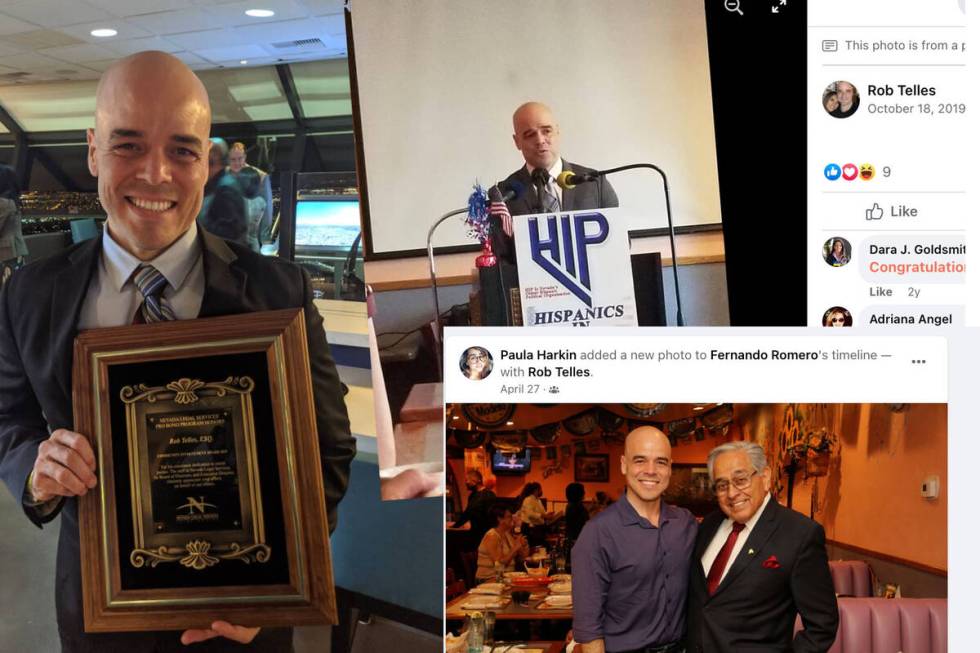
The two men were the same age, and Conger appreciated when his well-dressed boss took him out to lunch and gave him advice. He never saw him get upset.
“It’s possible that because I am not a woman, I saw a different side of him,” Conger says.
Two women who worked at Accolade say they did.
The firm shared a small, nondescript office suite on Sahara Avenue with a local homeowners’ association. The women — an assistant and a paralegal — worked there for less than a year. The Review-Journal granted them anonymity due to fears that sharing their experiences would affect their careers and families.
Their former boss’s controlling nature came out in little ways, they say, like when he stood over their cubicles and demanded they not eat lunch at their desks, despite the office not having a break room. The assistant says she quit the day Telles ran his hand down her back when they were alone together in the office.
“I just froze,” she says.
The former paralegal, who started in July 2015, says Telles’ sexual advances were constant. Within weeks of joining the firm, she says, he called her into his office and bluntly asked: “Would you like to have a relationship with me?”
The woman — seven years Telles’ senior and in a relationship — rebuffed his advances and reminded him that he was married, a fact he often brushed off, she says, saying he had Ismael’s permission.
Almost daily, she recounts, she endured unwelcome touching: Telles would come up behind her and smack her butt, smooch her ear or slide his hand down her thigh.
One day, he speculated that she had ADHD. He said he did, too, and demanded she take a bottle of vitamins to help her focus, she claims. He later claimed she was making mistakes that would jeopardize the firm and criticized her for not seeking treatment for the condition, which she says she has never been diagnosed with. If she wasn’t so beautiful, he would have fired her already, she says he wrote in a message to her.
“I was under a lot of stress because if you’re making out with my ear and grabbing my ass at work, I’m kind of not focused,” she says.
The woman showed the Review-Journal what she says were messages Telles sent to her on Skype, the communications application he used to talk with employees.
“You know how I feel about you,” one message says. “I really don’t want you to feel like your job is contingent upon having the relationship that we have outside of work.”
She says that one December 2015 morning around 2:30 a.m., her phone lit up with a message from Telles that he was headed to her house. She locked the doors in fright; he never arrived.
The last time Telles touched her, she says, he was bending over to give her a hug when she slapped him, turning his head crimson. He paused and his eyes twitched in shock.
It was then clear to him that she wasn’t interested, she says. He docked her pay and became upset when she canceled a work-related trip he said would help their relationship. She feigned sickness and instead of returning to work, she hired an attorney, who she says sent Telles a cease-and-desist letter in March 2016 for his behavior. She provided a copy of a letter to the Review-Journal.
Letter sent by Las Vegas lawyer to Robert Telles by Las Vegas Review-Journal on Scribd
One Accolade client, Brandy Hall, says Telles also acted inappropriately toward her. The two met in 2017 while she was the funeral director at La Paloma Funeral Services. She often referred families to his practice.
Before long, Telles started inviting Hall to lunch. He sent her gifts, including a Christmas tree and a $500 gift basket for her birthday.
When Hall was going through her divorce, Telles offered to represent her for free. Low on money and fighting for the custody of her two children, she agreed.
She claims Telles made unwanted passes at her. Once, she says, he grabbed her waist and tried to kiss her, which she blocked with a hand to his chest.
She says that he sent her a picture of his penis and a video of him masturbating in a bathroom, where she saw the reflection of his children’s toothbrushes in the dirty mirror. He was already a candidate for public office.
“I was a single mother and easy prey,” she says of Telles. “He had authority, he had money and a charming smile.”
Hall says that Telles was more focused on flirting than representing her in the courtroom. During a custody hearing in January 2019, she tells, he didn’t object to her husband’s request for joint custody of their children. A judge granted it.
Distraught to the point of nausea, Hall fled to the courthouse bathroom.
Kerry Faughnan, the attorney she hired after Telles left the case to go to the county, says Hall told him about the graphic messages when he took her case.
None of the women reported the allegations of sexual harassment to the state bar.
“He would have destroyed me career-wise,” says the former paralegal.
In early 2019, Telles assumed office as the public administrator.
Clark County: Peril at the public administrator’s office
When it came to his career, Telles answered to nobody.
The new boss took control of the obscure county office sternly and swiftly, according to some of his employees.
He was in charge of handling the estates of Las Vegas’ unclaimed dead but professed his ambition for something greater, maybe Clark County commissioner or Nevada governor, he told workers.
Most members of Telles’ small team welcomed their new boss with open arms. His experience in probate law was reassuring, and he had been endorsed by Cahill, their former boss. Many had voted for him.
But his attitude quickly soured.
Within weeks, he slammed both hands on a desk, said he was “ripping off the bandage” and stripped supervisory duties from his office’s top deputy, Rita Reid.
She and three other employees say they arrived at work each day with their stomachs in knots, a pervasive feeling that undercut their ability to help grieving families.
Reid said she reported her concerns to county officials, who asked how close she was to retirement. The office tension became so unbearable that she filed to run against Telles in the 2022 Democratic primary.
German described the turmoil in his first story in May: Six employees told him that Telles fueled the hostile environment and divided the office. Three other workers remained loyal to Telles.
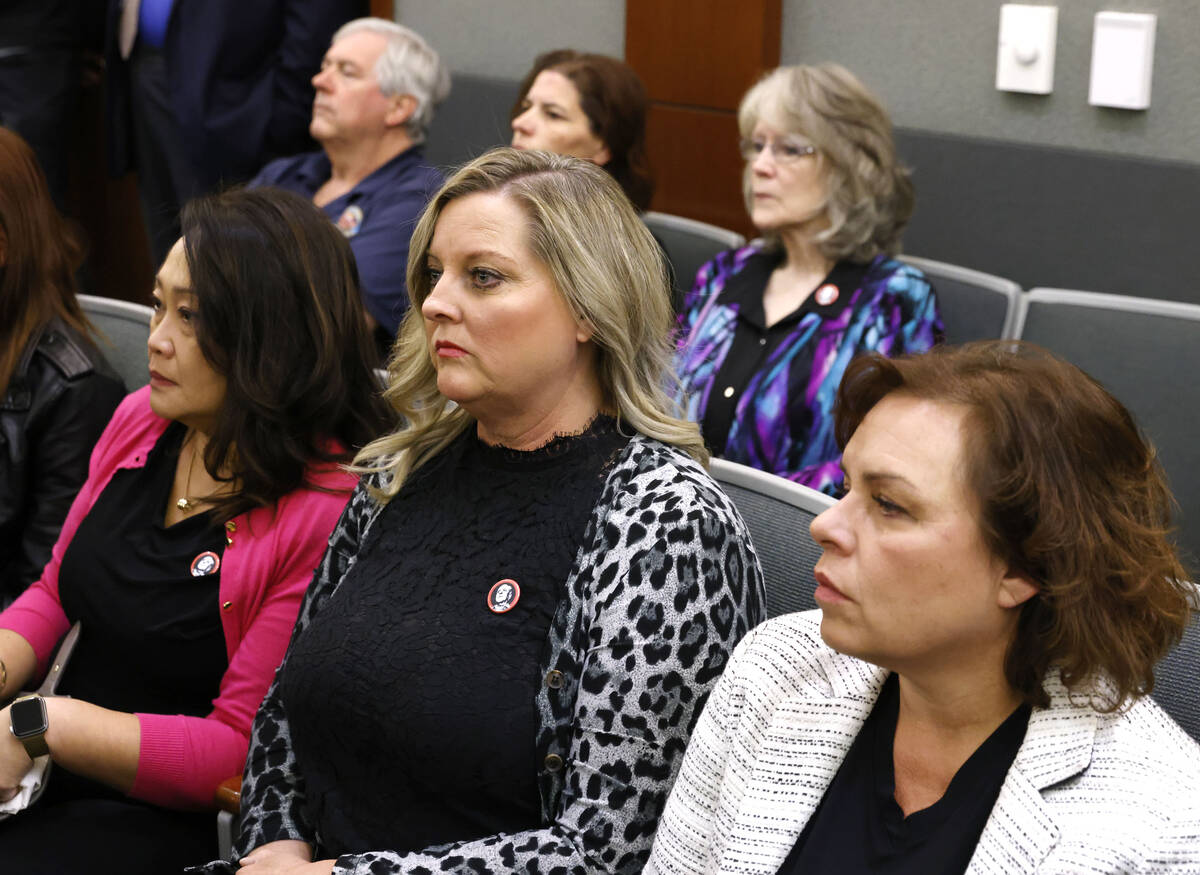
Estate coordinator Aleisha Goodwin reported how she was being treated in a 2020 complaint to the county’s Office of Diversity — a move that only drew more retaliation, according to a subsequent claim she filed in May 2022.
She felt singled out because of her religion. Telles asserted to others that she was part of a politically powerful “Mormon mafia,” removed her from team emails and pulled her off of cases she was working on, according to Goodwin’s complaints.
Telles told German that his employees’ claims were false and unsubstantiated. He also questioned the timing of the accusations, as he was seeking a second term in office, and Reid was running against him.
Interviews and documents show that starting in mid-2020, Clark County Deputy Manager Jeff Wells, his former boss, Yolanda King and other officials were aware of verbal and written complaints made against Telles, including employees who said they didn’t feel safe in their work environment. Wells failed to quickly address the brewing animosity.
In a statement this week, county spokesman Erik Pappa wrote, “Clark County has taken the appropriate steps when complaints were received through our formal reporting channels.”
Human resources received complaints — none of which included allegations of workplace violence — and they were investigated and addressed, according to Pappa. One investigation is still in progress and the others were closed once Telles was removed from office.
Ten days after German’s story exposed the office conflict, Wells hired former county coroner Michael Murphy as a consultant to address the friction.
The county released a statement in September, after German’s murder, asserting that once officials became aware of the personnel issues “the decision was made to no longer have staff in the public administrator’s office report to Mr. Telles.”
But county emails obtained by the Review-Journal show Telles in June told Murphy and Reid he would retain supervision over three employees. The county has refused requests to make officials available for interviews.
Janie Osuzik retired after more than 30 years with the county because she says Telles pushed her out. In a February complaint, she wrote that Telles retaliated against her and falsely accused her of stealing jewelry from the property vault.
The complaint was closed after unsuccessful attempts to reach the employee, who retired shortly after making her report, according to a county statement.
Employees remember that Telles was obsessed with his appearance, and he often talked about being bullied as a child for his weight. He shared uninvited details about his cosmetic under-eye surgery and showed them a photo of his tightened abdomen.
Telles started favoring one estate coordinator, Roberta Lee-Kennett, employees said. Several workers took the bold step of secretly videotaping them meeting in the back seat of her car in the shadows of a parking garage. They claimed it was proof of an “inappropriate relationship.”
Both Telles and Lee-Kennett denied having an affair. Telles said she was simply someone he could “lean on” while trying to change the office atmosphere. He said he caught Reid spying on him in the past, an allegation she denied.
Lee-Kennett, who is married and has said she and Telles are only friends, did not respond to requests for comment. In May, she told German, “I have not had an inappropriate relationship with him. I would not be friends with a man who thinks he’s going to have an inappropriate relationship with me.”
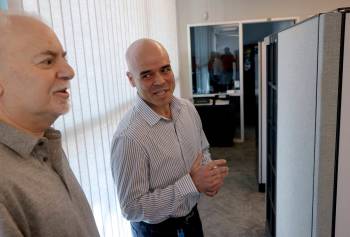
Ariana Payne and Nichole Lofton, two employees who told German they supported Telles, also did not respond to requests for comment. Lofton, who served as an estate coordinator, told German in May that her boss did everything he could to help her succeed, while his critics wanted her to fail.
“They told me from the beginning to pick a side,” she said. All three women have since transferred out of the department.
As an elected official, Telles broke state laws so he could close cases faster, Goodwin wrote in private papers she later showed to the Review-Journal.
She documented that he kept cremated remains in his office and once shipped an urn to the wrong family. When confronted about questionable decisions, Telles was often unbothered, she wrote. “If I get sued, I will represent myself,” he allegedly said.
Telles and the county were sued in 2019, after Telles rescinded a job offer to incoming employee Brandy Carman because of her grand jury service — a violation of federal law, according to court records.
Carman says she tried to work things out with Telles before she filed her lawsuit. She already worked for the county and was paid for the Tuesdays she served.
Telles emailed her that she had five days to get out of the jury obligation, which she claimed was legally impossible, according to court records.
Tears welled in her eyes as he delivered the ultimatum. She had already given notice to her boss in her current position and celebrated with her family and friends. She stood to earn considerably more money as an estate coordinator.
Please, she told Telles over the phone, she wanted this job, she needed it.
“Don’t you cry to me,” he growled, according to Carman’s recollection. “I don’t know who you think you are, and I don’t know who you think I am, but I’m not here to give you sympathy.”
Carman, who is two years older than Telles, says he called her a “young lady” and said he knew the law.
When she approached human resources, they acknowledged that what Telles was doing was illegal but said they had no jurisdiction over an elected official, Carman alleged in court records. When she threatened to sue, a county official said, “maybe that’s what needs to happen to get his attention,” the records state.
County officials offered her the position in exchange for dropping the lawsuit, which Carman rejected because she feared Telles would fire her anyway, according to the documents.
The county and Telles denied violating the law in court and settled the case last year for $35,000.
“My employer was supposed to protect me from this,” says Carman, who no longer works for the county. “They failed to do that.”
Telles: He had an answer to every allegation
Telles had answers for each allegation against him.
About the affair: They only hugged each other.
About the county turmoil: It was caused by “a handful of old-timers” who “were basically trying to railroad me.”
About German’s first article: “It was so ugly that you almost had to believe it was true. I can understand why you might have, with the writer’s skill at pushing buttons.”
When Telles was arrested in March 2020 on charges of battery against his wife and resisting police, he told them: “You guys just want to take me down because I am a public official.” The case was later dismissed, and Telles was able to avoid reporting the case to the state bar because of the nature of his plea deal.
No matter the circumstance, Telles maintained he was the victim.
In jailhouse interviews with multiple media outlets this September, he professed the same thing: He’s a good person who has made mistakes.
He refused to answer questions about the murder allegations, telling a TV reporter, “I’ve got nothing against the media at large.”
This summer, Telles attacked the Review-Journal on his campaign website, stating the allegations in German’s story were false. He leveled what the employees allege was a threat to retaliate against them for stepping forward.
The night German’s first story published, Telles wrote Wells and the county’s human resources department a scathing two-page email, records show. He claimed he was being constantly surveilled by disgruntled employees because he had “cut into their pocket books and made them work.”
“This has been devastating for my team to hear that these people who are torturing us day in and day out were now claiming to be victims,” he wrote.
Shocking arrest: Some say they never saw this coming
Since his murder arrest, a judge has removed Telles as public administrator, and Reid prevailed in the general election.
The state bar suspended his law license while it investigates whether he misappropriated client funds, and Las Vegas police are looking into allegations that Telles orchestrated a house-flipping scheme to personally profit from property sales while he was in office.
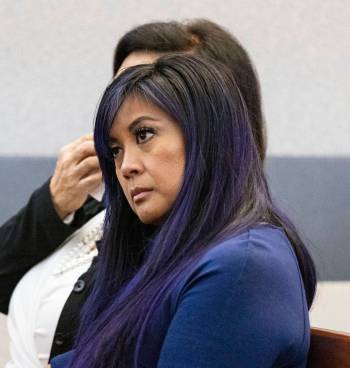
Those who knew Telles in other aspects of his life say they never saw this coming.
Telles’ ex-wife, Tonia Burton, says she was astonished by the accusations. She says Telles is a good father and that they split up because he wanted to be the “front-and-center superstar,” while she considers herself a stagehand.
“We had a lot of good times, we were happy. He made me laugh most of the time,” she says. “This is very uncharacteristic of the Robert Telles I know.”
Mae Ismael, his wife since 2010, did not respond to a request for comment. She has appeared to support her husband in court, where his attorney claimed during a recent bail hearing that Ismael has “expressed nothing but unconditional support” for the accused killer.
Telles, in a blue jumpsuit, kept his head down and his eyes closed. He appeared to cry, his shackled wrists firmly placed on his chest.
He was denied bail. A trial is set for April.
◆◆◆
The man accused of killing German always wanted to be a leader.
Telles had a way of gaining people’s trust, sowing division, then condemning and intimidating those who opposed him, according to many who knew him.
After German’s articles published, he lashed out on Twitter, tagging the reporter in a June 25 post — one that some former employees say illustrated who he was and who he became.
“Typical bully. Can’t take a pound of criticism after slinging 100 pounds of BS,” he wrote. “Up to article #4 now. You’d think he’d have better things to do.”
Those words better reflected their author than their target, the employees say.
More people reached out to German about how Telles had upended their lives. One former UNLV student said she was struck by the newspaper’s investigation, and that she experienced the same behavior a decade ago when Telles was president of the student bar.
“The pattern is the same.”
Review-Journal staff writers Arthur Kane and Colton Lochhead contributed to this report. Slain reporter Jeff German’s notes and records also contributed to the telling of this story.
Contact Briana Erickson at berickson@reviewjournal.com or 702-387-5244. Follow @ByBrianaE on Twitter. Erickson is a member of the Review-Journal’s investigative team, focusing on reporting that holds leaders and agencies accountable and exposes wrongdoing.
What is the Clark County Public Administrator's Office?
The office oversees the estates of those who died and is responsible for securing the property of the deceased while the family or an executor is located, according to the county. The office also administers estates via the courts, when families cannot.
As of mid-May 2022, the office had eight-full time employees, three part-time support staffers, and roughly 15 part-time investigators who spend most of their days in the field. Several workers have since transferred.
In a rare move, the county brought in former coroner Michael Murphy as a consultant to handle some administrative duties and contain friction between employees after the first investigative story published.
Forner Public Administrator Robert Telles, who was arrested and charged with murder, made $170,517.31 in salary and benefits in 2020, according to the Transparent Nevada website.



